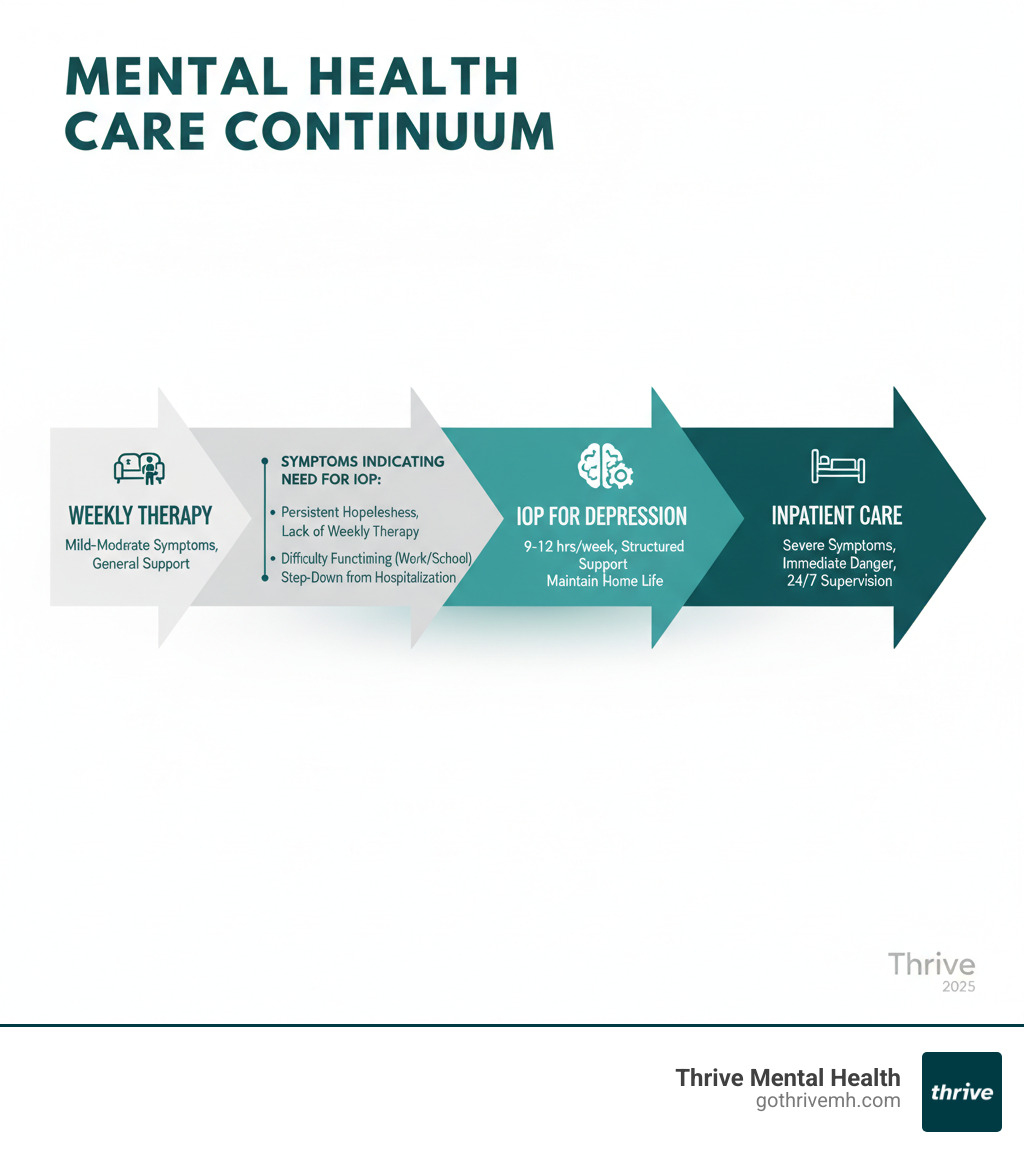IOP for Depression Explained: Your Path to Better Mental Health

A Note on Crisis Support
If you are having suicidal thoughts, contact the 988 Suicide & Crisis Lifeline for support from a trained counselor. If you or a loved one are in immediate danger, call 911.
IOP for Depression: Fast-Track Your Recovery When Weekly Therapy Isn’t Enough
Stuck in Depression? Why Weekly Therapy Might Not Be Enough
Depression doesn’t follow a predictable timeline. You might be going to therapy every week, doing the work, but still feel like you’re swimming through molasses. If this sounds familiar, you’re not alone, and more importantly, you’re not failing at recovery.
Sometimes, weekly therapy isn’t enough to break through persistent depression. It can feel like you’re not making progress despite your best efforts.
Common signs that weekly therapy might not be cutting it:
- You still experience hopelessness, low energy, and loss of interest in things you used to love.
- Sleep and appetite changes disrupt your daily life.
- You feel stuck in the same patterns despite months of therapy.
- Work, school, or relationships are suffering.
- You’re having thoughts of self-harm or suicide (If you’re in crisis, please call or text 988).
This is where the mental health care continuum comes in. It offers a ladder of support, so you don’t have to jump from weekly therapy to inpatient hospitalization. There’s a middle ground that might be exactly what you need.
IOP for depression—Intensive Outpatient Programs—fills that gap. Instead of one hour a week, you get 9-12 hours of structured, evidence-based support over several days. You sleep in your own bed and maintain your daily routines while getting the intensive focus that persistent depression requires.

Research shows that 93% of people in IOP programs report significant improvements in depression symptoms. This is because moderate to severe depression often needs more than weekly check-ins to create lasting change.
Whether you’re stepping down from a hospital stay or a professional who can’t take time off work, IOP for depression is designed for these situations, giving you intensive care without turning your life upside down.
At Thrive Mental Health, we’ve seen how combining individual therapy, group support, and evidence-based treatments in a concentrated format helps you build real skills and break patterns that keep you stuck. If weekly therapy isn’t moving the needle, it may just mean you need a different level of care that matches the intensity of what you’re facing.
What Is an IOP for Depression? The Step Up That Fits Your Life
When weekly therapy isn’t enough but residential treatment feels like too much, IOP for depression offers the perfect middle ground. An Intensive Outpatient Program provides structured mental health treatment that lets you keep your life intact.
Think of it this way: if weekly therapy is a vitamin, IOP for depression is a concentrated dose of healing. You live at home and maintain your schedule, but instead of one hour of therapy a week, you get 9 to 12 hours of focused, evidence-based treatment over several days.
At Thrive, our programs are designed so you can immediately practice what you learn in your actual environment—no artificial setting, just real skills for your real world. The flexibility is key. You can attend sessions that fit your schedule, getting intensive help without pausing your career or education.
A typical week might involve 3-4 hour blocks of therapy on several evenings, including individual therapy, group sessions, and skill-building workshops. You then go home and apply these new strategies in real time.
For more details about how we structure our programs and what makes our approach unique, check out Thrive’s IOP for depression.
To help you understand where IOP fits in the mental health treatment landscape, here’s how different levels of care compare:
| Feature | Weekly Therapy | Intensive Outpatient Program (IOP) | Inpatient Care |
|---|---|---|---|
| Time Commitment | 1-2 hours/week | 9-12 hours/week | 24/7 |
| Living Situation | At home | At home | At facility |
| Intensity Level | Low | Moderate to High | Very High |
| Flexibility | Very High | High | Low |
| Best For | Mild symptoms, ongoing support | Moderate to severe depression, need for structure | Crisis situations, severe impairment |
The key difference is that IOP for depression gives you intensive support without turning your life upside down, allowing you to stay connected to your work, support system, and daily routines.
Is IOP for Depression Right for You?

Choosing the right level of care is tough, especially when you’re struggling. If weekly therapy isn’t enough, IOP for depression can be the turning point. You may need more support if you’re not making progress, are barely functioning at work or school, or need structure after a hospital stay.
IOP is designed to address the full spectrum of depression symptoms:
- Persistent hopelessness and feelings of worthlessness
- Complete loss of interest in activities that used to bring joy
- Overwhelming fatigue and low energy
- Disrupted sleep and appetite
- Difficulty concentrating or making decisions
When these symptoms are severe, and especially if thoughts of death or suicide creep in, it’s a clear signal that you need immediate, intensive support. For comprehensive information about how we approach these complex symptoms, explore our depression treatment at Thrive. We serve adults and young professionals across Florida.
Who Benefits Most from IOP for Depression?
- Moderate to severe depression: When symptoms interfere with your ability to work, maintain relationships, or care for yourself, IOP provides the necessary intensive support.
- Treatment-resistant depression: If you’ve tried other approaches without success, the multi-layered approach of an IOP often succeeds where single methods have not.
- Co-occurring anxiety: Depression and anxiety often go hand-in-hand. Research shows 90% of clients in IOPs report improvements in both. Our integrated approach treats them together.
- Need for structure: The regular schedule of an IOP creates stability when life feels chaotic, providing a reliable anchor during recovery.
- Step-down after hospitalization: IOP serves as a crucial bridge from 24/7 care back to daily life, providing support as you regain independence.
If you’re in crisis, call or text 988 right now. You are not alone.
How IOP Fits Your Real Life
A major benefit of IOP for depression is that you don’t have to put your life on hold. It’s designed to work around your commitments.
- Flexible Scheduling: With evening programs, you can work during the day and attend therapy after.
- Virtual/Hybrid Options: Our programs for Florida residents eliminate commute time and increase accessibility.
- Real-Time Practice: You learn a coping strategy in a session and can apply it immediately at work or home, which helps the skills stick.
You’re not pausing your life to get better; you’re learning to steer it with better tools. Our Virtual IOP has made high-quality care more accessible than ever.
Inside Thrive’s IOP: What to Expect

Your journey at Thrive begins with a comprehensive intake and assessment where our clinical team takes the time to understand your story, symptoms, and goals. From there, we develop a personalized treatment plan that fits your life.
You’ll be supported by a multidisciplinary team—including your primary therapist and a psychiatrist for medication management—who collaborate on your care. A typical IOP for depression runs about 9 to 12 weeks, giving you time to build and practice lasting skills. For a deeper dive into what your weeks will look like, check out our detailed guide on What to Expect in IOP.
Core Components of IOP for Depression
Our program integrates several key components that work together to support your healing:
- Individual Therapy: One-on-one sessions with your primary therapist to dig deep into personal challenges and develop custom coping strategies.
- Group Therapy: Professionally facilitated sessions with 5-15 peers who understand what you’re experiencing, reducing isolation and building community.
- Family Therapy: When appropriate, these sessions help loved ones understand depression and learn how to best support your recovery.
- Medication Management: Our psychiatrists work with your therapy team to ensure any medication is working optimally, making adjustments as needed.
- Skill-Building Workshops: Interactive sessions that teach concrete tools, like mindfulness and problem-solving, for managing daily stressors.
Evidence-Based Therapies That Work
At Thrive, we use therapies proven by research to be effective for depression.
Cognitive Behavioral Therapy (CBT) is a cornerstone of our program. It teaches you to identify, challenge, and reframe the negative thought patterns that fuel depression. You learn to become an expert on your own thinking, separating facts from the feelings that depression creates.
Dialectical Behavior Therapy (DBT) is especially helpful for managing overwhelming emotions. It focuses on four key skills:
- Mindfulness: Staying present and observing your thoughts without judgment.
- Distress Tolerance: Navigating crisis moments without making them worse.
- Emotion Regulation: Understanding and managing your feelings.
- Interpersonal Effectiveness: Communicating your needs and maintaining healthy relationships.
Research shows just how effective DBT can be in an IOP setting. One study found that people participating in DBT-based IOPs not only saw significant decreases in their depression scores but also reported increased feelings of hope. Our approach also emphasizes mindfulness and trauma-informed care, ensuring you feel safe and empowered throughout your treatment.
Why Choose IOP? Real Results for Depression

When you’re struggling with depression, you want to know that your treatment will actually work. The good news? IOP for depression delivers real, measurable results that can transform your daily experience. At Thrive, we’ve seen countless individuals refind hope and joy through our intensive outpatient programs.
The numbers tell a compelling story. 93% of our clients report improvements in depression symptoms, while 90% see significant progress with anxiety symptoms. But behind these statistics are real people who’ve learned to manage their triggers, found their energy returning, and rebuilt meaningful connections with others.
What makes IOPs so effective? The intensive nature creates momentum that weekly therapy often can’t match. You’re not just talking about your problems once a week and hoping things improve between sessions. Instead, you’re actively building coping skills and practicing them in real-time, creating a strong support network through group therapy, and addressing the root causes of your depression with evidence-based treatments.
Research backs up what we see in our programs every day. Studies show that IOPs are as effective as inpatient care for treating depression when someone isn’t in immediate danger. This means you can achieve the same level of symptom reduction and long-term recovery without disrupting your entire life.
The change goes beyond just feeling better. Our clients develop skills that serve them long after they complete the program. They learn to reduce isolation by connecting with others who understand their struggles. They build confidence in their ability to handle difficult emotions. Most importantly, they refind activities and relationships that bring meaning to their lives.
We believe quality mental healthcare should be within reach for everyone. That’s why Thrive accepts insurance from major providers including Cigna, Optum, Florida Blue, and many others. Our programs serve adults and young professionals across Florida, with flexible scheduling options that work around your commitments.
Getting started is easier than you might think. You can verify your insurance in 2 minutes with no obligation, giving you peace of mind about coverage before you begin. This accessibility, combined with our proven track record, makes choosing an IOP a practical step toward lasting recovery from depression.
FAQs: IOP for Depression
When you’re considering an IOP for depression, it’s natural to have questions about how it works and whether it’s right for your situation. These are some of the most common concerns we hear from people exploring this treatment option.
How is IOP different from inpatient or residential treatment?
The biggest difference is where you sleep at night. With an IOP for depression, you attend treatment sessions for several hours during the day or evening, then return home to your own bed. You can continue working, going to school, and maintaining your daily routines while receiving intensive support.
Inpatient care, on the other hand, means staying at a treatment facility 24/7. This level of care is designed for people who need constant supervision for their safety or are experiencing severe symptoms that require immediate stabilization. Think of IOP as getting the therapeutic intensity you need while keeping your life moving forward.
Can I keep my job or stay in school during IOP?
Absolutely. This is one of the biggest advantages of IOP for depression – it’s designed to work around your life, not replace it. At Thrive, we offer flexible scheduling options, including evening programs, specifically so you can balance treatment with your responsibilities.
Our virtual programs make this even easier. You can attend sessions from your home office during a lunch break or join evening groups after work. Many of our clients find that staying engaged with work or school actually helps their recovery by maintaining structure and purpose in their daily lives.
How long does IOP last?
Most IOPs for depression run between 9 and 12 weeks, but there’s no one-size-fits-all timeline. Your treatment plan is personalized based on how you’re progressing, the severity of your symptoms, and whether you’re dealing with other conditions alongside depression.
Some people might benefit from a shorter program if they’re stepping down from a higher level of care and just need that bridge back to independence. Others might need a longer program, especially if they’re dealing with treatment-resistant depression or complex trauma. Your team will work with you to determine what makes sense for your unique situation.
Does insurance cover IOP for depression?
Good news – many insurance plans do cover IOP for depression. We work with major providers including Cigna, Optum, and Florida Blue, among others. Coverage can vary depending on your specific plan, but IOPs are generally recognized as a medically necessary level of care for moderate to severe depression.
The easiest way to find out about your coverage is to check your insurance benefits here. It takes just a couple of minutes and gives you a clear picture of what your plan covers, so there are no surprises.
Is virtual IOP as effective as in-person?
Research shows that virtual IOP for depression can be just as effective as in-person programs. This might seem surprising, but when you think about it, the core therapeutic elements – individual therapy, group sessions, skill-building – all translate well to a virtual format.
At Thrive, we offer both virtual and hybrid options for residents in Florida. Many people actually prefer virtual programs because they eliminate travel time and allow them to attend from a comfortable, private space. You still get the same expert-led, evidence-based care and meaningful connections with your treatment team and peers – just through a screen instead of across a room.
Ready to Break Free from Depression?
If weekly therapy isn’t enough, or you need structure after inpatient care, IOP for depression at Thrive can help you achieve lasting recovery.
Our expert-led programs are designed around your life. With flexible virtual and hybrid options and evening programs, you don’t have to put your career, education, or family on hold. We provide evidence-based care that adapts to your schedule, serving adults and young professionals across Florida.
Thrive is committed to personalized, compassionate treatment. Our multidisciplinary team creates a plan that addresses your unique goals, and our programs have helped thousands, with 93% of our clients reporting significant symptom improvements.
If you’re wondering whether you need the intensity of an IOP or might benefit from our Partial Hospitalization Program instead, you can learn more about PHP vs. IOP at Thrive to understand which level of care matches your current needs. We’ve also created helpful resources to guide your decision-making process, including our related blog: How to Know If You Need More Than Weekly Therapy.
With Thrive’s IOP for depression, you’re investing in a support system that equips you with lasting skills to build the fulfilling life you deserve.
Take the Next Step
You’ve learned about IOP for depression and how it can transform your mental health journey. Now it’s time to take action. The hardest part of recovery is often just beginning, but you don’t have to face it alone.
At Thrive, we’ve made getting started as simple as possible. Our virtual and hybrid IOP/PHP programs are designed with your real life in mind – complete with evening options that work around your job, school, or family commitments. For residents of Florida, our virtual programs make expert care just a click or call away.
Ready to see if we’re the right fit? You can verify your insurance in 2 minutes with absolutely no obligation. It’s quick, private, and gives you the information you need to make an informed decision about your mental health care. Many of our clients are surprised to find their insurance covers more than they expected.
Prefer to talk to a real person? Call us at 561-203-6085. Our team understands that reaching out takes courage, and we’re here to answer your questions, address your concerns, and help you understand your options. No pressure, no sales pitch – just honest guidance from people who genuinely care about your wellbeing.
Seeking help is a sign of strength, not weakness. Every day you wait is another day you could be building the skills and support system that will change your life. The path to feeling better starts with a single step – and that step is reaching out.
If you’re in crisis right now, don’t wait. Call or text 988 immediately. Crisis counselors are available 24/7, and you deserve immediate support when you need it most.